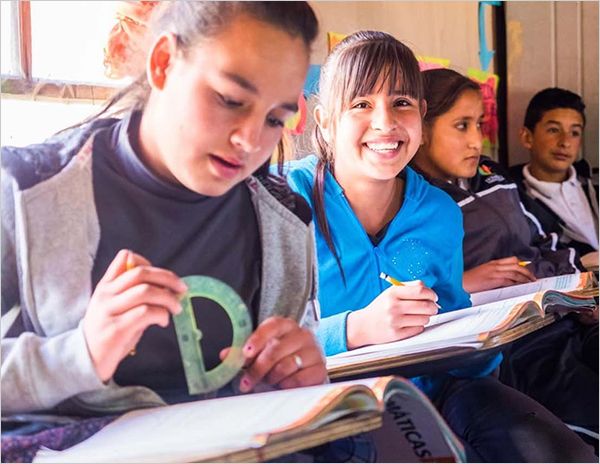
In many host mining towns, there’s a group of people quietly pioneering the future. They’re not geologists or the mine engineers. They’re the teachers selflessly trying to pave the way for the next generation.
On a recent visit to a rural community in Mexico, I met teachers who, after a full day of lessons, would go home to learn the country’s new education curriculum. They do it on their own time with no overtime pay, often without the Internet, in homes with variable electricity and limited access to clean water.
The dedication of these teachers stretches to being mentors, counselors, role models, and a bridge between parents and the broader changes happening around them.
Riding the booms
Often they are doing this amidst rapidly changing conditions. Some of these towns are seeing sudden influxes of people attracted by the economic opportunities offered by the mine. The downside of these sudden booms in activity is that social cohesion can fray.
With some long-time residents feeling overwhelmed by change, schools act as an island of stability and familiarity along with the church.
Schools are a centre where communities come together, be it for sports events, festivals, parent-teacher meetings, and informal support networks. When a mine expands, bringing jobs and also new social pressures, it is often the teachers who help keep the community together.
Yet these educators are among the most undervalued contributors to the success of host mining communities. Their classrooms are often under-equipped, their pay is modest and their working conditions are challenging – despite their outsized contribution.
This is one of the reasons why at M4H we're helping to set up science labs for students in mining towns and to elevate the role of teachers and help them with their mission of supporting future generations. We also want those children to enjoy better life prospects.
Bleak future
I believe that talent is everywhere and in terms of these communities it is a greatly under-explored and under-developed resource.
I’ve seen first-hand just how bright and curious these children are. And I’ve also seen how their potential is at risk of being wasted, simply because the basic infrastructure isn’t there.
One of the main reasons I’m so keen for these children to have access to decent education is because their prospects in adulthood can be tragic.
One of the mining engineers I occasionally deal with did an unofficial survey to find out what the children’s main ambitions are when they grow up. The results were shocking – for girls it was to go into prostitution and the boys wanted to join one of the cartels.
It’s not their fault. It simply reflects a chronic lack of opportunity. A decent education would give them a chance of getting 'proper' jobs when they grow up and avoid sliding into criminality.
One of my big inspirations behind this initiative is Gabriela Mistral, the Chilean poet and educator who became South America’s first Nobel Laureate in Literature.
Mistral championed the rights of children, women, and the rural poor.
She founded evening schools for workers, created educational programmes for Indigenous children and later helped rebuild Mexico’s education system after the revolution. She believed that dignity begins with learning and that education could be a radical, transformative force in society.
I agree with her wholeheartedly!
The teachers I met in Mexico share her spirit. They may not have the literary fame of Mistral or her global recognition, but in their own communities, they are heroes to many of the children and their parents.
The business case
There’s also a powerful business case here for supporting high quality educational initiatives in host mining communities.
A 2023 study published in Science Direct called ‘Developing models to assess the social impact of mining’ found that local communities view mining more positively when the mining company directly supports education, health, and basic services. In other words, investing in teachers isn’t just the right thing to do for the community, it strengthens the social licence to operate.
If teachers are the glue, then education is a golden thread that can run through every thriving mining community. And mining companies, if they’re serious about long-term community partnership, have a unique opportunity to give the next generation a big leg up through high quality educational initiatives.
I’ll leave you with this powerful quote from Mistral, which says it all: “Many things we need can wait. The child cannot. To them we cannot say tomorrow. Their name is today.”
